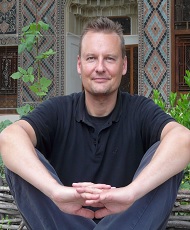

 Web Content Display
Web Content Display
Web Content Display
Web Content Display

 Navigation
Navigation
Navigation
Navigation
 Web Content Display
Web Content Display
Web Content Display
Web Content Display

e-mail: krzysztof.trzcinski@uj.edu.pl
Profesor nadzwyczajny w Instytucie Bliskiego i Dalekiego Wschodu WSMiP UJ od 2017 r., politolog, afrykanista, historyk idei i badacz współczesnej filozofii politycznej. Analizuje różne koncepcje formalnych i nieformalnych rozwiązań instytucjonalnych, w tym typu power-sharing, które mogą przyczyniać się do budowy optymalnej organizacji politycznej społeczeństw sfragmentaryzowanych, zwłaszcza wieloetnicznych w Afryce Subsaharyjskiej. Identyfikuje jawne i niejawne funkcje afrykańskiego władztwa tradycyjnego. Bada procesy demokratyzacji i efektywność działania instytucji władzy w różnych państwach Afryki, a także Azji (zwłaszcza w Indonezji i Timorze Wschodnim), teorię i praktykę demokracji oraz korelację między demokracją a rozwojem cywilizacyjnym.
Studiował międzynarodowe stosunki gospodarcze i polityczne, nauki polityczne oraz prawo europejskie. Magisterium, doktorat i habilitację uzyskał na Uniwersytecie Warszawskim. Odbywa staże i kwerendy na Uniwersytecie Cambridge. Regularnie odwiedza państwa Afryki i Azji, w których prowadzi studia terenowe, w tym rozmowy z intelektualistami i ludźmi władzy.
Jest autorem ponad siedemdziesięciu prac naukowych. Wygłosił ponad czterdzieści referatów i odczytów na konferencjach i innych forach międzynarodowych oraz krajowych, w tym m.in. na uniwersytetach: Nigerii, Indonezji, Witwatersrand, Cambridge i St Andrews. Tworzy archiwum fotograficzne dokumentujące modernizację społeczeństw Afryki Subsaharyjskiej.
Jest tutorem Collegium Invisibile i członkiem Kolegium Clare Hall Uniwersytetu Cambridge.
Prof. Trzciński, Ph.D., Dr. habil., is a political scientist, an Africanist, a historian of ideas and a scholar of contemporary political philosophy. He analyses various formal and informal concepts of institutional arrangements (including forms of power-sharing) that may contribute to the emergence of an optimal political organization in fragmented societies, especially those of multi-ethnic Sub-Saharan Africa. He describes the overt and hidden functions of traditional African chiefdom. He studies the democratization process and the effectiveness of the institutions of power in different countries of Africa and Asia (especially Indonesia and East Timor), the theory and practice of democracy and the correlation between democracy and civilizational development.
Prof. Trzciński has studied international economic and political relations, political science and European law. He earned his master, doctoral and habilitation degrees at the University of Warsaw. He has been on fellowships and has conducted research at the University of Cambridge. He is a regular visitor to African and Asian countries, where he conducts field research projects, including discussions with local intellectuals and public officials.
He has authored over seventy academic publications (journal articles, book chapters, and books). He has given over forty lectures and talks at conferences and other forums, including the universities of Nigeria, Indonesia,Witwatersrand, Cambridge and St Andrews. He is compiling a photo archive documenting the modernization process of societies in Sub-Saharan Africa.
Prof. Trzciński is a tutor of the Collegium Invisibile and a Life Member of Clare Hall, University of Cambridge.